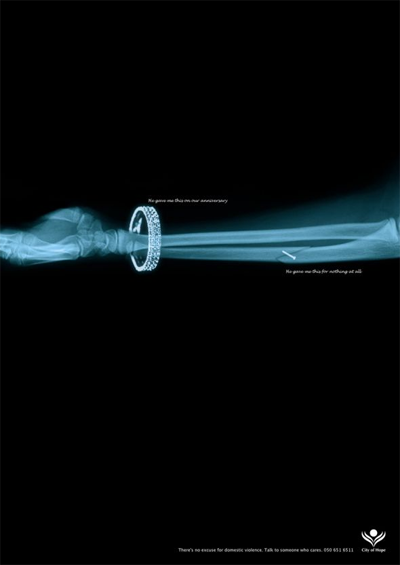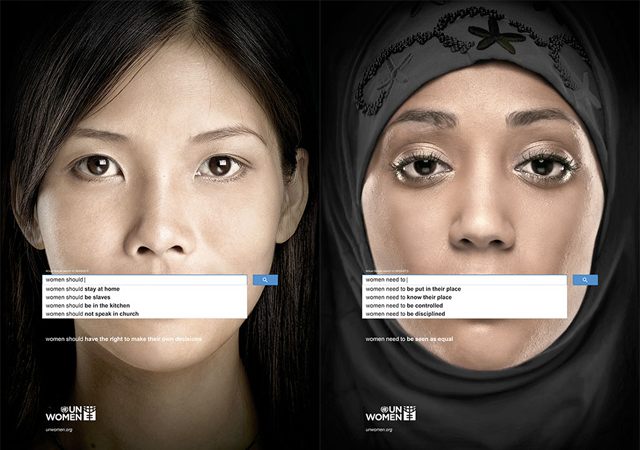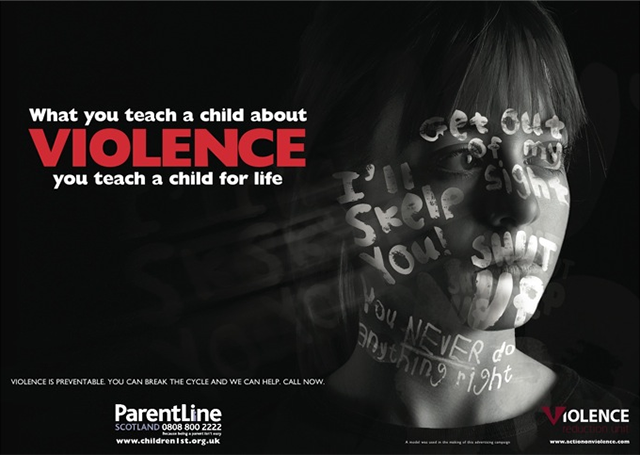According to a recent survey by More Magazine and Verizon Foundation, women who have experienced domestic violence are “significantly more likely to suffer from a chronic health condition.” Of the survey respondents who said they have experienced abuse, 81% reported having a chronic health condition (including lower back pain, high blood pressure, migraines and chronic headaches and difficulty sleeping) compared to 62% among those who had not experienced abuse. The survey also found that those who have experienced domestic violence have, on average, more chronic health conditions (2.7 conditions per person) than those who have not (1.7 conditions per person).
Conducted by GfK Custom Research, the survey polled a nationally representative sample of 1,005 women over age 21 and was conducted in August 2013.

(next to fracture) “He gave me this for nothing at all.”
via Ads of the World
Another key finding surfaced by the study was that only 25% of respondents had been asked during a medical exam if they had experienced abusive behaviours, though 95% said they believed it was important for doctors and nurses to address this. The numbers are even lower for dentists and dental hygienists, who are uniquely positioned to see soft tissue injuries inside a woman’s mouth after she’s been hit in the face or choked: only 3% of respondents had been asked by a dental professional about potential abuse.
ThinkProgress reported that this is likely to improve under the Affordable Care Act as regular domestic violence screenings, which are considered an essential preventative health service, are now covered free of charge. Earlier this year, the U.S. Preventative Services Task Force found that screening women for intimate partner violence with a list of standard questions showed a “moderate net benefit,” though there are currently no standardised protocols for screening.
If abuse is confirmed, the Task Force further recommends that physicians should provide or refer patients to intervention services (including counselling, home visits, information cards, community service referrals and mentor programmes). Only 18% of the More/Verizon survey respondents who had been asked about domestic violence by their healthcare professionals were then provided with resources or a referral to get help.

National rates of domestic violence are high. 44% of survey respondents said they had experienced some form of domestic violence (emotional, physical, sexual and/or economic) at the hands of a partner. A January 2013 study by the Centers for Disease Control and Prevention (CDC) based on a survey of 16,000 U.S. adults found that “gay people in the United States are just as likely as heterosexuals to experience domestic violence, sexual violence or stalking, and bisexual women are more likely than other women to be abused.” Regardless of sexual orientation, the majority of women faced male perpetrators.
Studies like the More/Verizon survey show that the popular image of a domestic violence victim – that of a visibly battered woman with a bruised face – only brushes the tip of the iceberg, as physical injury is just one manifestation of the long-term harm experienced by those who survive abusive relationships. Aside from the increased risk of chronic health conditions, rates of mental illness and substance abuse are strongly correlated with occurrences of domestic violence, and domestic or sexual violence is the largest immediate cause of homelessness in the country.
Long-term impacts of domestic violence are intergenerational, too. Children who experience or witness violence are prone to behavioural, social and emotional problems as well as cognitive and attitudinal problems, and witnessing violence between one’s parents or caretakers is the strongest risk factor of transmitting violence from one generation to the next.
Furthermore, not many studies, this one included, take into account the varied (and likely increased) incidence rates, impact and consequences of domestic violence among more vulnerable populations: women of colour, women with disabilities, trans* women, and so on.

October was National Domestic Violence Awareness Month and November 25 marks the International Day for the Elimination of Violence Against Women, in turn starting the 16 Days of Activism Against Gender Violence, which concludes on December 10, Human Rights Day. In spite of this, domestic violence continues to be a problem that is underreported and inadequately addressed. Alongside preventing domestic violence from happening in the first place, there is still a lot of work to be done in recognising and alleviating the long-term consequences of abuse.
The full results of the study, titled “The Verizon Foundation and More Magazine Survey: Exploring the Relationship between Domestic Violence and Chronic Health Conditions,” can be found in the November issue of More (on sale Oct 22).








Comments
Thanks for writing up this article. For those who work in medical fields, how does one even bring up the question of domestic abuse? I’m not at all surprised by the low rates since it’s such a taboo subject to initiate, so how do we break that mentality of “not my business” or “she’ll deny it anyways”.
The nurse practitioner I see always asks if I’m in a relationship and if I feel safe in it. I like the question “do you feel safe?” because it opens the door for the conversation, and even if the patient is in an abusive situation that they aren’t ready to take take action on, it still establishes that safety in a relationship is a norm.
You may be able to get a training on this from your local rape crisis center or intimate partner violence prevention/response provider. I know my local rape crisis center runs a training for medical professionals on how to screen for sexual violence, so it wouldn’t surprise me if such trainings exist for intimate partner violence too.
yes thank you. as a dentist we are taught to look for signs of trauma which might stem from physical abuse but in real life I wouldn’t ask unless there were signs that concerned me. many people would not take kindly to being asked out of the blue and it would need to be brought up extremely tactfully.
this is not to say that much improvement cannot be made, because it should! and more visibility of the issue and discussion in mainstream media will help it to become something that is brought up routinely and asked of everyone not just those who we suspect.
Yeah, that was my main thought – that it’s a very sensitive topic, and a lot of people would be offended at the question.
The extremely high rates of intimate partner violence against bi/pan/fluid and trans* people especially women, is something I’d really like to see the queer community pay more attention to.
There’s an excellent Boston-based service provider, The Network/La Red, which works to respond to and end partner abuse in LGBTQ, poly, and BDSM communities, as well as doing a lot of anti-oppression coalition-building. They have informational handouts specifically targeted at bi and trans* people, as those communities experience such high abuse rates.
Also, hi everyone, I am new to Autostraddle!
THIS this this. I did some research for a paper on this, and the fact that there were SO FEW good sources hints at the problem. An instinct not to air dirty laundry hurts people who are being hurt already, period.
And yes, women can be abusers.
That’s all. But I think this is an important conversation.
Yes yes yes. There’s a huge need for more discussion on LGBT intimate partner violence, especially given how our identities as queer can make IPV even more complex (threats of outing, undermining/delegitimizing a persons identity, etc). And especially since the “expansion” of VAWA has yet to disseminate down to providers and many shelters/safe houses still will not accept anyone who is a cis woman.
Northwest Network is another great resource on LGBT IPV. They do a lot of great work with existing agencies and also have really fantastic online resources. Also, many state-wide LGBT victims services agencies often have resources for those who are in an abusive relationship and can help with getting protection orders, navigating the legal system, and providing general advocacy (i.e. Equality Michigan).
*ALSO* if you think you may be in an abusive relationship and need some guidance in finding help in your area, please feel free to privately message me. I’ve been very active in the movement against domestic violence for over 5 years (I just resigned from a position as a counselor/advocate in a shelter in Metro Detroit), and currently intern with the victim services department at Equality Michigan. Even if you just need to talk or share your story, please feels free to message me.
*who is not a cis woman
Sorry for the typo.
And who exactly are going to talk about it? People privileged enough to be able to command resources of care and retributive justice.
the rest will do the wise thing – because when you are wounded, the last thing you need is so called help leaving you with much more deep and lasting scars. Also, body heals, rest doesn’t – technically you might want to protect cognitive function above all. And if something is run and hired by subsentients with your ordinary run-of-the-mill war criminal mentality – you might want to stay away as far as possible and heh…let’s say interact…only when you’re at your strongest, backed by establishmental power and have 2/1 odds on your side, not when you’re alone, down and vulnerable. Horizon Facility from Mass Effect much?